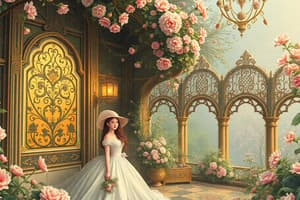Podcast
Questions and Answers
What is a primary function of many art forms?
What is a primary function of many art forms?
How does art contribute to economic activity?
How does art contribute to economic activity?
What effect does engaging with the arts have on personal growth?
What effect does engaging with the arts have on personal growth?
In what way can art be used as social commentary?
In what way can art be used as social commentary?
Signup and view all the answers
What role does art play in cultural preservation?
What role does art play in cultural preservation?
Signup and view all the answers
What is a fundamental aspect of the arts?
What is a fundamental aspect of the arts?
Signup and view all the answers
Which branch of the arts primarily focuses on language?
Which branch of the arts primarily focuses on language?
Signup and view all the answers
Which characteristic of the arts refers to evoking beauty and pleasure?
Which characteristic of the arts refers to evoking beauty and pleasure?
Signup and view all the answers
Performing arts involve which of the following?
Performing arts involve which of the following?
Signup and view all the answers
How do the arts document history?
How do the arts document history?
Signup and view all the answers
What role does emotional impact play in the arts?
What role does emotional impact play in the arts?
Signup and view all the answers
What is the primary focus of culinary arts?
What is the primary focus of culinary arts?
Signup and view all the answers
Which of the following best describes how arts serve as a means of communication?
Which of the following best describes how arts serve as a means of communication?
Signup and view all the answers
Study Notes
Definition and Scope
- Arts encompass a vast range of human creative endeavors and their outcomes.
- It involves conveying ideas, emotions, aesthetics, and cultural values.
- Examples include visual arts (painting, sculpture, photography), performing arts (music, theatre, dance), literary arts (poetry, fiction, drama), and culinary arts.
- Arts are often categorized by medium, technique, historical period, or cultural context.
Key Characteristics of the Arts
- Creativity: A core aspect of the arts, involving the generation of new ideas and expressions.
- Aesthetics: Arts frequently aim to evoke beauty, harmony, and pleasure through sensory experiences.
- Emotional Impact: Arts can evoke a wide range of emotions, including joy, sorrow, fear, and wonder in viewers.
- Cultural Significance: Arts embody and shape cultural values, traditions, and beliefs within a community.
- Historical Context: Artistic styles and practices evolve over time, influenced by social, political, and technological shifts.
- Expression of Self: Artists often employ their art to communicate personal experiences, perspectives, and emotions.
Branches of the Arts
-
Visual Arts:
- Includes painting, sculpture, drawing, printmaking, photography, graphic design, and mixed media.
- Defined by visual elements like color, form, line, and composition.
- Typically presented statically for viewing.
-
Performing Arts:
- Encompasses music, theatre, dance, opera, and circus arts.
- Demand a live audience and the physical presence of artists.
- Driven by creativity, collaboration, and performance elements like timing and execution.
-
Literary Arts:
- Comprises poetry, fiction, drama, and non-fiction/essay writing.
- Relies heavily on language as the primary medium.
- Explores themes of human experience, emotions, and ideas.
-
Culinary Arts:
- Covers cooking, baking, and the presentation of food.
- Centers on preparing, arranging, and showcasing food.
- Emphasizes aesthetic and innovative skills.
Functions and Pursuits of Arts
-
Communication:
- Arts serve as powerful tools for communication between artists and audiences.
- Messages are conveyed through symbolism, imagery, performance, written words, and other expressions.
-
Documentation:
- Art serves as a recorder of history, culture, and daily life.
- Different artistic styles and materials reflect the social and technological development of eras.
-
Entertainment:
- A primary function of many art forms is to entertain and offer enjoyment to the audience.
- Visual, auditory, or physical experiences create pleasure and engagement.
-
Social Commentary:
- Some artists use their work to address social or political issues, providing critique and raising awareness.
-
Personal Growth:
- Engaging with the arts can stimulate intellectual, emotional, and cognitive development in individuals.
- Learning about diverse artistic styles and techniques expands perspectives.
Impact of Art on Society
-
Cultural Preservation:
- Art plays a role in preserving cultural heritage through storytelling, the transmission of traditions, and the presentation of historical contexts.
-
Social Commentary:
- Art can be used to challenge social norms, expose inequalities, and advocate for social change.
-
Economic Impact:
- The arts contribute to tourism, job creation, and economic growth in various regions.
- Art museums, galleries, and cultural institutions contribute to economic activity.
-
Emotional Connection:
- Arts offer opportunities for emotional connection and expression among people.
- Exposure to art can foster empathy and understanding.
Studying That Suits You
Use AI to generate personalized quizzes and flashcards to suit your learning preferences.
Description
Explore the diverse world of the arts, including its definition, key characteristics, and various forms. This quiz will help you understand how creativity, aesthetics, emotional impact, and cultural significance all play a role in the expression of artistic endeavors.




